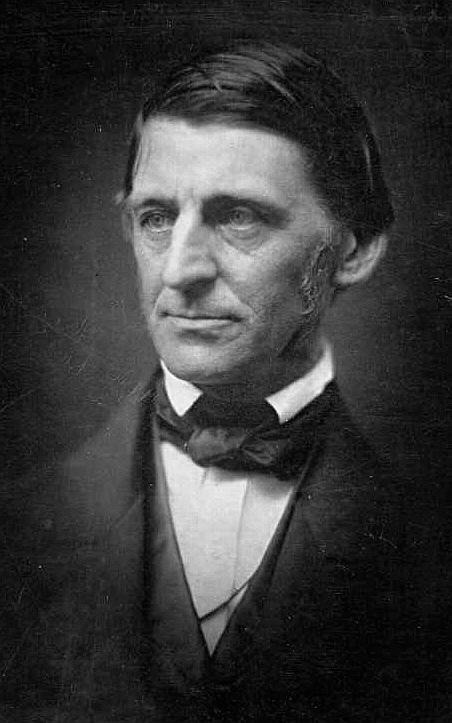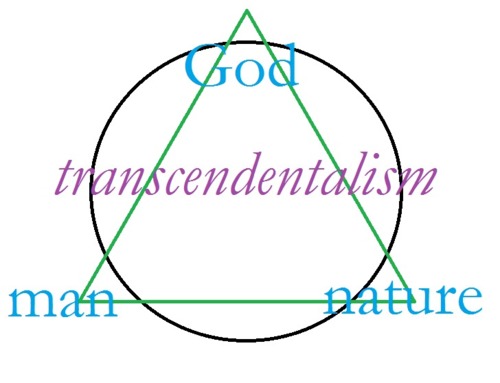Transcendentalists
By: Daniel Jacobs and Drew Kirkendoll
Transcendentalism- an idea that people can transcend or overcome the mind's limits.
Origin
Transcendentalism came about in the 1820s and 1830s. It is a philosophical and religious movement that evolved in the Eastern region of the United States. Transcendentalism contains a heap of different ideas from many different religions including
Beliefs
Transcendentalism emphasizes feeling over reason and communion with the real world. It is basically a "don't think, just feel your way through life" philosophy. The basic principles are based on divine inner body and goes beyond what people can hear, see, feel, taste, and touch. Transcendentalists believe in Individualism, that people are their best when they are independent. God was unknowable, and the transcendentalists understood God and themselves by feeling a connection to nature.
Influences
Transcendentalism was an influence on many religious and literary groups. The movement was a direct influence to the New Thought movement. Emerson was an Unitarian preacher, so Unitarianism grew from the basis of transcendentalism into a prospering religion. Hinduism was also influenced by transcendentalism.
Major Figures
 -Ralph Waldo Emerson led the transcendentalist movement. In his novel, Nature, he expressed his philosophy of the new idea. He came the leader of his philosophy group in the mid 19th century.
-Ralph Waldo Emerson led the transcendentalist movement. In his novel, Nature, he expressed his philosophy of the new idea. He came the leader of his philosophy group in the mid 19th century. -Henry David Thoreau
-John Muir
-Margaret Fuller

Emerson
ReplyDeleteAs the leader of the movement i believe in every aspect of transcendentalism. I stand behind this movement entirely, this is the way to the future. Transcendentalism is the future.
Second Great Awakening
ReplyDeleteI believe that the Transcendalism movement and the Second Great Awakening would go together very nicely, with our movement getting people to go to church and your movement giving people the spiritual peace they so desire.
Isaac Hamilton
Hawthorne
ReplyDeleteI completely disagree with these beliefs and the philosophy of transcendentalism. There is not limitless potential and no confidence is growing. Humanity is full of doubt and mistakes. Humanity's dark side will always surface. But, thank you for the inspiration for the majority of my novels. This movement was the intellectual fuel I needed.
Mary and Will.
Poe, did not always like the people in the transcendentalism movement. He would often say that those in the movement were "Frogpondians." He wrote some stories supporting the movement, but others that would criticize those part of it.
ReplyDeleteKatie Fulkerson and Kelby Krampe
Transcendentalism, in our humble opinion, is a dumb movement. It believes in feeling controlling every aspect of life, completely disregarding reason. Without reason, how can anything that anyone does make sense?
ReplyDeleteMichael Clore and Davis Mitchell
Shakers; Transcendentalism, in our humble opinion, is a dumb movement. It believes in feeling controlling every aspect of life, completely disregarding reason. Without reason, how can anything that anyone does make sense?
ReplyDeleteMichael Clore and Davis Mitchell
Thoreau
ReplyDeleteHenry agreed with the Transcendentalists. Henry was one of the founding fathers of the Transcendentalism movement. Henry greatly supported this way of life and these beliefs.
Elizabeth and Christina
Melville: Transcendentalists, you gave me the inspiration while writing “Moby Dick”. You inspired the character of Captain Ahab. You, like the captain, believed the mind had no limit concerning improvement.
ReplyDeleteMikayla & Sarah
Abolitionist movement: Transcendentalists, This movement is of very little consequence as apposed to some of the bigger and more pressing matters we have to attend to! Just look at all the African Americans enslaved and held captive today! We need to be pressing for their freedom first and foremost. How can we come to a conclusion to this idea and take a accurate stance on it when nearly half of our U.S population are seen as mere tools of labor.
ReplyDelete-Andrew McIntosh Joey Phillips
The Second Great Awakening
ReplyDeleteThis idea is completely absurd; the idea that the Church influences people to such a degree is ridiculous. The Church guides people to the right ideas and values but ultimately it comes down to the individual. Being a member of the Church congregated with fellow believers provides a strong sense of unity and ultimately brings believers closer to God, it is not something that can be found randomly in nature.
Luke and Paul Reid